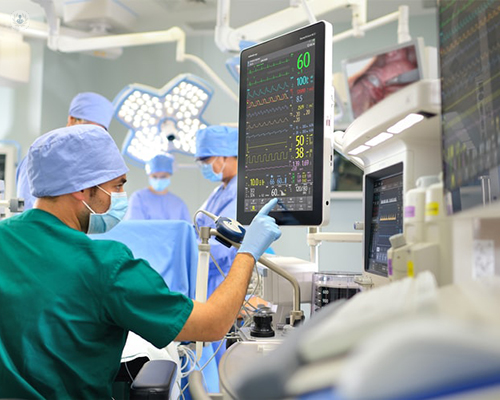Laparoscopic hernia surgery: preparation, procedure and recovery
Written in association with:Hernias can be treated with either an open or a laparoscopic (keyhole) operation. With both techniques the aim is the same; to treat the hernia. The advantage of laparoscopic surgery is that the scars will be smaller and in most cases, the recovery time will be quicker.
We spoke to one of our highly experienced surgeons Mr Yüksel Gerçek to explain what you can expect with the operation, from preparation to the procedure itself and what life is like after surgery.

Is laparoscopic surgery equally as effective for all hernia types?
Yes, laparoscopic surgery is equally effective for all types of hernia. In fact, it is the preferred operation for some of the groin hernias like a femoral hernia.
How do I prepare for the procedure?
The preparation for all surgical procedures is similar. You will need to be assessed before surgery for fitness.
On the day of surgery, you need to avoid eating for six hours and drinking water up to two hours before surgery. Most of the regular medication needs to be continued. This can be discussed during the pre-operative assessment.
What will happen during the procedure?
Most operations for hernia are done under general anaesthetic. The operation will be keyhole or open. Sometimes a keyhole operation has to be changed to an open operation. A mesh is used for most hernia operations. This is also advised by the British Hernia Society for most hernias.
What can I expect from in the short and long-term recovery period?
Some pain is inevitable and you will be advised to take an over-the-counter medication such as paracetamol/ibuprofen. This should give adequate pain relief so ensure you have a supply at home.
There may be some bruising at the operation site, which is entirely normal and will gradually go down. You may notice that there is a numb area below the wound. In most cases, these sensations will gradually return but sometimes a small area of numbness remains.
Mobility is very important and you should try to remain physically active. If you feel tired you should sit down and put your feet up for short periods and not go to bed during the day. This will improve circulation in your legs and reduce the risk of deep vein thrombosis (DVT).
When it comes to hygiene, you will be advised to shower rather than have a bath for the first 10 days. The dressing provided should be waterproof but check with your local hospital.
As you recover you will be able to increase your activities. You will be able to return to work within one to two weeks but if your job involves heavy lifting it may be up to six weeks before you can return to work. You should discuss this with your consultant.
Mr Yüksel Gerçek is a surgical expert in treating colorectal cancer, bowel cancer, haemorrhoids, fistula, and hernias. You can book an appointment to see him via his Top Doctor’s profile here.



